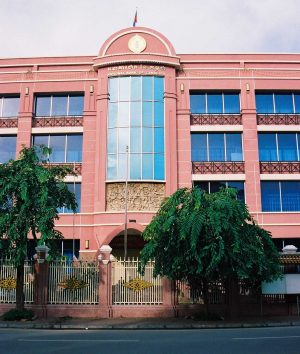Ever since United Nations peacekeepers arrived in war-torn Cambodia to oversee elections held in 1993, the U.S. dollar has been a mainstay of the local economy with a dual currency system providing steady exchange rates in a volatile place.
That began to change in May when the National Bank of Cambodia (NBC) announced it would phase-out small-denominated U.S. dollar bills – $1, $2, and $5 notes – following negotiations with banks and micro-finance institutions (MFIs).
“Cambodia has to encourage the use of its riel, more. So, allowing the circulation of small U.S. bills is an obstacle in urging the use of the riel,” the NBC said.
Essentially the move and the introduction of digital currencies will give the central bank more control over the Cambodian economy and bolster the local riel currency, which for decades suffered from a lack of confidence due to negative sentiment stemming from a 30-year war.
That includes control over monetary policy and interest rate settings and reduced costs in handling the sheer volume of $1 dollar notes circulating through the economy.
It’s a far cry from the late 1970s, when Khmer Rouge rule abandoned money, banks were abolished, and the NBC blown-up as Pol Pot tried to create a utopian, agrarian society that led to the deaths of an estimated 1.7 million Cambodians.
A dual currency economy is a reminder of the days when Cambodia was seen as an economic basket case and it’s that type of history the NBC Governor Chea Chanto and politicians negotiating investments with China would prefer to leave behind.
Speaking at the recent 40th anniversary of the re-establishment of the riel, he said demand for the currency had increased by an average of 16 percent a year for the last 20 years amid annual average growth rates of 7.8 percent and inflation at around 2.5 percent.
“I firmly believe all ministries, institutions, companies, enterprises, and those who actively participate in the process of developing the banking system promote the use of the riel, which is our national currency,” he said.
Chea Chanto also said the country’s foreign reserves had reached $20 billion, more than the three-month minimum for developing countries and enough to cover 10 months’ worth of imports.
As one analyst, who declined to be named, said: “It’s also a matter of sovereignty and pride. It’s their country and they are entitled to have their own currency like anywhere else.”
The central bank has introduced larger denominated notes in Cambodian riel, ranging up to 100,000 Cambodian riel (roughly $25), but their arrival had caused confusion and rumors among traders in the local markets amid speculation that smaller U.S. notes had been banned.
That started a rush to offload dollars and prompted Prime Minister Hun Sen to step in and deny that small denomination U.S. notes had been prohibited.
Adding to a sense of urgency was a slide in regional currencies against the greenback in the first half of this year, causing a similar decline in the riel, which normally trades around 4,000 Cambodian riel to the dollar. Weakness in the local currency was exacerbated by its close ties to the US dollar.
That hurt economic activity and in particular rural households and farmers, while the broader economy has since buckled under the COVID-19 pandemic and the withdrawal of some trade perks by the European Union due to the country’s human rights record.
In limiting the economy’s exposure to the dollar, the NBC is also encouraging cashless online transactions and has introduced its first central bank-backed digital currency, Bakong, a blockchain-based platform enabling payments between banks and other financial institutions.
Bakong, a mobile app of the same name, works in both digital riel and U.S. dollars. Developed by Japanese fintech firm Soramitsu, the government is hoping the platform will open-up financial inclusion to the “unbanked population” – which is to say, the majority of Cambodians.
Digital currencies will make money transactions cheaper, reduce money laundering, and some say will even be healthier because, as scientists have pointed out, the physical exchange of cash has the potential to spread infectious diseases like COVID-19.
In most countries such moves by a central bank might be considered routine, but in Cambodia these are major steps. Such are the legacies of a war which obliterated the economy, devas
Luke Hunt can be followed on twitter @lukeanthonyhunt

































